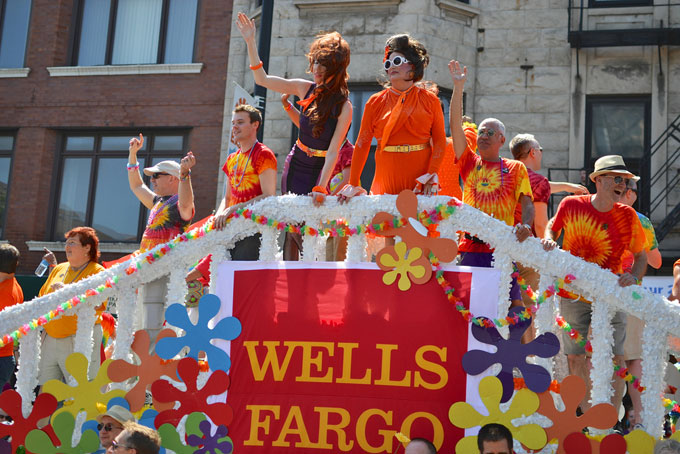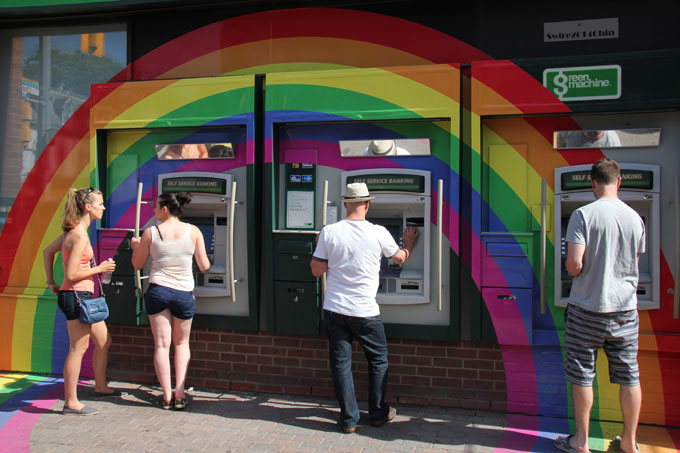
Wells Fargo sponsored float at the Chicago gay pride parade in 2013. Photo by flickr user nathanmac87. June 30, 2013.
As Pride month comes to an end, cities across the United States wrap up a month of celebrations marked by rainbow flags, vodka ads and too many floats filled with white men dancing to party music. At the same time there will be some who know that we don’t actually have much to be proud of. We remember the reason for this celebration: the Stonewall riots happened 46 years ago this weekend, on June 28, 1969, as an uprising led by low-income trans people against police brutality. Stonewall was not a marketing scheme; it was a revolutionary moment.
The warped, hypocritical nature of contemporary pride celebrations has become particularly visible over the last several years. What has happened is almost too ridiculous to be true: LGBT rights have ceased to be about LGBT people ourselves. They have become about political dominance—tools that powerful people, institutions and whole nations use as a false marker of progressivism. We see this when Chevron, Goldman Sachs and other machines of economic apartheid receive corporate equality awards and when the press reports on national gay rights organizations collecting checks from big oil and drone manufacturers. Why worry about this corporatization? Because the LGBT movement and Pride month as a whole have become a display of accumulation of power for the already enfranchised rather than a movement that engages seriously with the ways in which gender and sexual oppression are intimately connected to other forms of injustice.
The attitude of some of the most visible LGBT rights organizations seems to be: who needs bread when you can eat wedding cake?
In the past several years we’ve seen several ostensible “gains” for the “LGBT community.” The rollback of the Defense of Marriage Act opened up the institution of marriage. The repeal of “don’t ask, don’t tell” made it possible for openly gay, lesbian and bisexual (but not trans) officers to serve in the military. Campaigns against anti-gay legislation overseas, including the sodomy law in India and the “kill the gays bill” in Uganda, reached a global audience, with many calling for sanctions. Several celebrities, most recently Caitlyn Jenner, have come out publicly as transgender. The community as a rhetorical whole has achieved more national visibility. But visibility for some does not translate to justice for most.
Data about the global LGBT population is hard to come by, but it’s easy to extrapolate: the supermajority of LGBT people around the world are not white and are not wealthy. This thing that we call “sexuality” is never distinct from “race” or “class”; in fact it is constituted by them. The head of the U.S. Agency for International Development said recently that LGBT people are among “the most victimized” by poverty worldwide. The poverty rate among trans people in the United States is four times the national average. LGBT people are overpoliced—more likely to have direct contact with police or to be incarcerated. According to the National Coalition of Anti-Violence Programs, 2013 actually brought a 21 percent increase in reports of hate violence (PDF) against LGBT communities in the United States, particularly against black and Latina trans women. An LGBT movement that focuses on very narrow agendas is not serving a community that, as a whole, has much more urgent and concrete needs, like housing and jobs. Yet the attitude of some of the most visible LGBT rights organizations seems to be: who needs bread when you can eat wedding cake?
In this context we question what has been handed to us as markers of “progress”: political recognition by officials and institutions that criminalize, incarcerate and deport members of our communities and the visibility of rich white individuals who are not representative of LGBT people as a whole. We challenge the claim that the United States and other nations that have passed gay marriage legislation are “progressive.” LGBT people aren’t dying because there aren’t enough weddings or enough sanctions against Uganda. It seems clear to us that they are dying because of racist and classist state policies—policies that these gay “victories” often invest in and strengthen. Don’t forget: LGBT hate crimes legislation was attached to a defense spending bill.

TD Bank ATMs decorated with rainbows for Pride Month in Toronto. Photo by flickr user Canadian Pacific. June 21, 2014.
Genuine LGBT progress does not always look like gain. It often looks like ending or stopping things. It looks like ending the racial wealth divide because, for LGBT people, especially those who are poor and of color, legal equality has not become lived equality. It looks like stopping evictions, deportations and the development of new prisons because LGBT people continue to be criminalized at disproportionately high rates. It looks like pulling the U.S. military from its various occupations so we don’t witness more cases like that of Jennifer Laude, a Filipina trans woman killed in Manila—a U.S. soldier is currently on trial for her murder. It looks like divesting from the police state so we don’t see more cases like that of Mya Hall, a black trans woman murdered by the police in Baltimore. It looks like withholding support from LGBT organizations that ignore racial and economic justice and investing instead in grassroots activist organizations like the Audre Lorde Project, FIERCE and the TGI Justice Project.
In other words, we don’t actually need more narrow LGBT rights; we need an end to and a reversal of huge historical wrongs.

